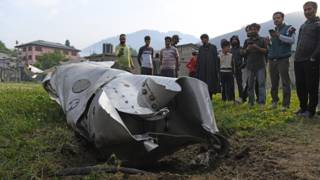
Guests
- Vijay Prashadprofessor of international studies at Trinity College and columnist for the Indian magazine Frontline.
In Kashmir, another protester was killed and as many as 50 people wounded when Indian security forces opened fire and threw tear gas at crowds of protesters on Wednesday. Residents say the confrontation came after Indian troops descended on a neighborhood, beating people and destroying a tent that was to host a meeting about Kashmir’s independence. About 70 people have died in Kashmir since anti-India protests erupted on July 8, after Indian security forces killed a prominent Kashmiri independence leader. On Wednesday, the Indian home minister traveled to Kashmir for a two-day visit aimed at defusing the protests. Among those who have been killed is a 30-year-old professor who was beaten to death in Indian army custody. Many others have reported being beaten by troops in their own homes. We speak with Vijay Prashad, whose recent piece on Kashmir is titled “Deadly Violence Erupts in One of the World’s Most Dangerous Hotspots.”
Transcript
AMY GOODMAN: And very briefly, though I want to make sure we touch on it, you wrote recently about Kashmir, saying, “Deadly Violence Erupts in One of the World’s Most Dangerous Hotspots,” Vijay Prashad.
VIJAY PRASHAD: You know, Amy, let’s—if we were going to be political scientists, let’s ask, “What’s the ratio of security force to population, you know, until when we call something an occupation?” In Kashmir, for every civilian—for every seven civilians, there is a security force—you know, there’s an army officer or an army personnel. That’s seven to one. Seven civilians, one army person. You know, if this is not an occupation, what else is it? I mean, the Indian ruling elite needs to come to terms with the fact that you cannot have any politics when you have such an enormous military presence inside Kashmir. And, you know, there is no point talking about the details of this, Amy, until this is on the table and seriously discussed. Everything else follows.
AMY GOODMAN: And for what people should understand who aren’t following Kashmir at all?
VIJAY PRASHAD: Well, you know, Kashmir is also a divided society. There’s the Kashmir Valley, where the deepest resentment against the Indian government is experienced, where the main demonstrations have been happening. But there’s also the area of Jammu, which is a complicated area where there’s much less, you know, political resentment against the Indian government. So, you know, Kashmir itself is a divided—Jammu and Kashmir is a divided state. There is a divided politics there. The Indian government needs to have a proper full dialogue with the various parties there towards an understanding of what the future should be. You know, should the future be some kind of condominium created between India and Pakistan over Kashmir? Should the future be that there are more rights for people? Should the future be the removal of the Indian army, you know, and this enormous presence? This needs to be a political process. There is no easy formula.
AMY GOODMAN: Well, Vijay Prashad, I want to thank you for being with us, professor of international studies at Trinity College, columnist for the Indian magazine Frontline. His new book, The Death of the Nation and the Future of the Arab Revolution.
This is Democracy Now! When we come back, the famed actress Emma Thompson has just come back from a visit to the Arctic, where she’s been before. Why? Stay with us.













Media Options